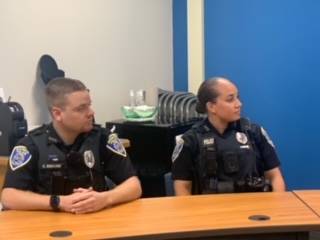
School Resource Officer Miah Stevens receives a lot of questions about what she does every day at Batavia City Schools, and the answer is simple, she says.
“We're just placed in the school. We do everything we would do on the road and more. We get to build relationships with students, we get to kind of act as counselors in certain situations,” she said during the school board’s meeting this week. “For our agreement with the schools, we go to the training from the state of New York Police Juvenile Officers Association. So we are members of this, and basically they just help us stay up to date on laws that change or any other information that we should need to know.”
She gave the presentation along with the latest addition, second SRO Connor Borchert, who began in September 2022.
"So the roles of an SRO wear many different hats, as you all may know, but typically, the goals of a well-defined SRO program include providing safe learning environments in our nation's schools providing valuable resources, school staff members, fostering positive relationships with youth, developing strategies to resolve problems affecting youth and protecting all students so that they can reach their fullest potential. This is right off of a national school resource officer website,” Borchert said.
A school resource officer (SRO) is defined by that state site as “a carefully selected, specifically trained, and properly equipped law enforcement officer with sworn authority, trained in school-based law enforcement and crisis response and assigned by an employing law enforcement agency to work collaboratively with one or more schools using community-oriented policing concepts.”
So when Stevens is asked what she does, she explains that “we need to participate in the program,” no matter what program that may be. She and/or Borchert were at open houses, Careers and Candy, Shop with a Cop, Polar Plunge, family reading nights, Thanksgiving food drives, bike raffles, Golisano’s Hospital toy drive, Community Night Out, and Lion’s Club Day of Caring.
They were also at various sporting events and banquets, school dances, plays, musicals, the Mr. Batavia competition and graduation ceremonies.
“You know, we're definitely looking for more opportunities to get in the classroom, so the kids know our names and we know their names is truly helpful,” Stevens said. “Some of this is police jargon, it's what we would consider a call, you know, dealing with, we do a lot of community policing, assist, citizen can call for anything. We're doing lockouts for somebody in the parking lot to having somebody with a personal problem. But basically, we have a large range of different types of things we handle, like I said, pretty much anything that we would handle on the road, if it involves the school in any way.
“You know, it just creates a partnership where now, if students get into an altercation outside of school, they are now coming into school and a lot of times those problems come with them. So it kind of gives the school another resource,” she said. “We get to be that liaison where they can say hey, we heard so and so I was involved in an incident … is there anything we should be on the lookout for and then I can either go back and either I'm getting an email from one of my co-workers or I'm going back and looking at the call log and reading the call and being able to say, okay, this is kind of what we should expect from this.”
Incidents handled or SRO involvements (no total numbers provided) in the 2022-2023 school year included:
- Harassments
- Disturbances
- Suspicious Conditions
- Mental Health Situations
- Community Policing
- Assist Citizen
- Bus Issues
- Fire Alarms (Intentional and Accidental)
- Property Accidents
- Larcenies
- Courtesy Transports
- Superintendent’s Hearings
- Classroom Lessons
- Check Welfare
- Students and staff personal issues
- Criminal Mischief
- Disorderly Conduct
- Home visits
- 911 Hangup calls
- Parking Complaints
- Property Complaints
- Sporting events
- Lockdown/ Fire Drills
- Mediations
Stevens said that adding a second SRO allowed for more feasible coverage of five schools, split up coverage for both officers, and allowed for more positive interactions with staff and students. Both officers will be working toward future goals of a DARE program and the I Love You Guys standard response protocol, which is to enhance proactive communication between the school district, police department and community.
“It's easier now to build relationships with the school community, we have a lot more positive interactions with staff and students, which is really the goal and that's really what we're looking for," she said. "You know, I've had so many more people come up to me this year, now that they're used to seeing my face and they're saying, Oh, my God, I'm so glad you're here today. And then when they get to see both of us and we're both walking around the football games, and we're both handling prom, you know, I had multiple parents come up to us the other night when we were at prom and say, I'm so thankful that you guys are gonna be here all night. Because it's just in this era. It's just, it's an easier solution.”
